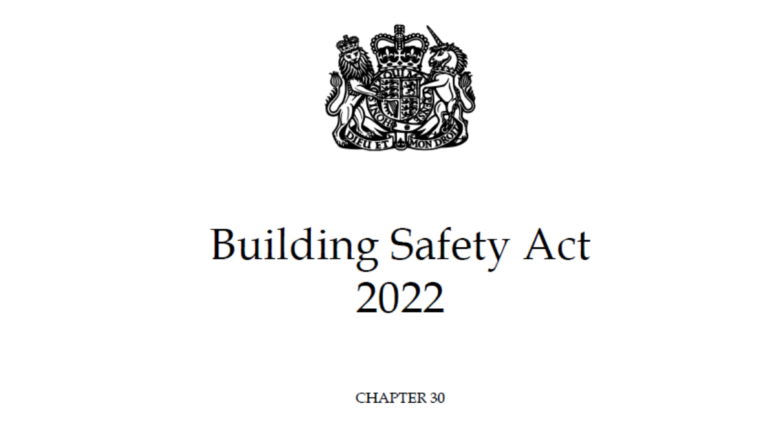Provisions of the Building Safety Act 2022 have come into effect, meaning that from 28 June 2022 qualifying leaseholders will be protected from unfair bills asking them to pay for work to make their homes safe.
Those responsible for historical safety defects, and those who own buildings, will instead be required to fund essential repairs.
The Government said some developers ‘are already stepping up and doing the right thing’. Some 45 of the UK’s biggest homebuilders have agreed to fix life-critical fire-safety defects on all buildings of 11 metres and higher that they have played a role in developing or refurbishing in the last 30 years.
Stronger measures in the Act include new powers for the Secretary of State to restrict irresponsible developers’ ability to build new homes, an extension of the Building Safety levy, worth an estimated £3bn, and improving building owners’ rights to launch legal action against developers.
‘Today marks a major turning point for building safety in this country’, said Levelling Up Secretary Michael Gove.
‘Hundreds of thousands of innocent leaseholders now have the legal protection they rightly deserve, freeing them from a financial burden they should never have faced’.
Gove said the Government is now ‘focusing intensively on work with lenders to unlock the mortgage market and empower leaseholders to take their next step on the property ladder’ – ‘and we will remain vigilant if anyone fails to act on the pledges they have made’.
Protections in the Act cover leaseholders living in their own homes (or with up to three UK properties in total) in buildings above 11 metres tall or of at least five storeys. They will be protected from costs associated with remediation work to remove and replace unsafe cladding and will ‘also have robust and far-reaching protections from the costs associated with non-cladding defects, including interim measures like waking watches’.
It will be illegal for freeholders linked to the building’s development, to pass on to leaseholders the cost of rectifying historical safety defects including removal of cladding.
It will also be illegal for all freeholders to pass on historical building safety costs to qualifying leaseholders who pass a ‘wealth test’ set out in law.
Where a developer cannot be held responsible and the building owner is not required to meet the costs in full, leaseholders with non-cladding related issues will be protected by a cap on how much they can pay for non-cladding related work. The cap applies to leaseholders whose property is valued at more than £325,000 in London, or £175,000 outside London. Owners of properties below these valuations will pay nothing.
Any costs that are not recoverable from leaseholders will need to be met by building owners and landlords.
Meanwhile Michael Gove has written to building owners and managing agents setting out their responsibilities under the Building Safety Act. The days of leaseholders being faced with large invoices for building safety repairs are now over, he said. The letter reminds freeholders that their responsibilities have been increased and now include ensuring buildings have updated fire risk assessments that reflect the latest guidance on proportionality.
• In Wales, Minister for Climate Change, Julie James has published information to leaseholders on the country’s new Leaseholder Support Scheme. This will provide ‘tailored, independent advice’ to leaseholders who are owner occupiers and to those who have become displaced residents. All eligible leaseholders are to receive advice from an Independent Financial Adviser, with the costs fully covered by the Welsh Government.
‘If the sale of their property is the right route, the Welsh Government will enable them to sell their property at a fair market value, but it has to be the right solution for the household’.
• The Leasehold Reform (Ground Rent) Act 2022 takes effect on 30 June 2022, ending ground rents for most new long residential leases granted for properties in England and Wales.
‘Agents should be aware of the impact on affected properties bought and sold from this date, with only a peppercorn ground rent being legal on new residential leases established after the commencement of the Act’, said the Government.
The change applies to new long leases (exceeding 21 years) granted for a premium (the purchase price) for single dwellings on or after 30 June 2022. Leases changed by a ‘deemed surrender and regrant’ with no premium being charged are also covered.
In addition to ground rents being restricted to a peppercorn for affected properties, the Act also bans landlords from charging a fee related to collecting a peppercorn rent. There is no obligation to actually collect a peppercorn from leaseholders.
Statutory lease extensions for flats must already be granted at a peppercorn, and statutory lease extensions for houses remain unchanged. Enforcement of the new provisions will be by Local Authorities, which can order any prohibited ground rent to be repaid.
Guidance from the UK Government for leaseholders, freeholders and managing agents has been published to accompany the new provisions, and the How to Lease guide has also been updated.








